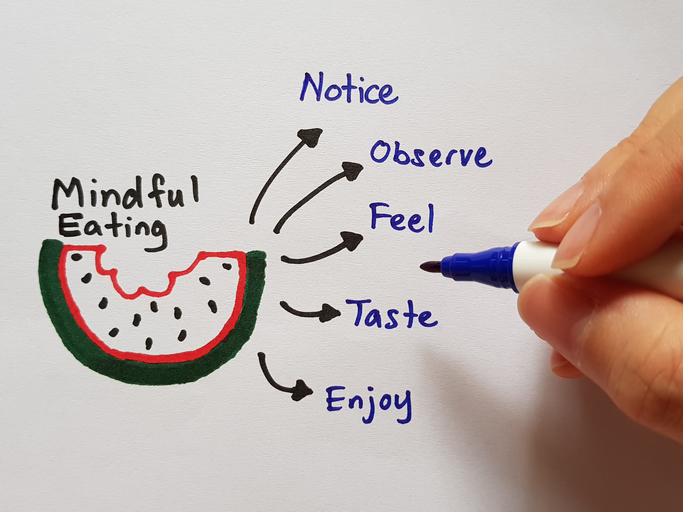A Healthy Eater is a Slow Eater

By Joy Stephenson-Laws, J.D., Founder
I hope everyone had a safe and healthy 4th of July holiday. Summer celebrations in the U.S. usually involve a lot of booze and food. Apparently, pie eating contests are another thing. A simple Google search of “pie eating contests 4th of July” produces stories of these competitive eating challenges around the country, including Key West, Florida, Fullerton, California (not far from me) and Saugatuck, Michigan.

My intention is not to be a party pooper, but, truth be told, fast eating just isn’t safe. Take, for instance, the incredibly tragic story of Natalie Buss, a 37-year-old mother who reportedly choked to death during a marshmallow eating competition.
In 2014, a man also died due to choking while participating in a hot dog eating contest. And in 2017, a young college student choked and died during a pancake eating contest for charity.
These unfortunate incidents were accidents, but there are actual career competitive eaters who risk their health constantly with fast, excessive eating. Choking is a very scary risk of competitive eating, but other risks include permanently enlarging the stomach, disordered eating and the development of heart disease and type 2 diabetes.
“Like ultramarathoners hoofing 50 miles or football players shaking off big hits, ‘speed-eating’ entails natural resilience, dedicated training, and serious risks to health,” according to an article from Time Magazine that discusses the risks of competitive eating and a famous hot dog eating competition that occurred this past 4th of July.
Although you may not be a competitive eater, you may be a fast eater.
Of course, being a generally fast eater does not put you in the same lane as a competitive eater, but that does not mean that eating fast does not come with a whole host of potential health consequences.
First, who is considered a fast eater?
According to an article I came across from Cleveland Clinic, “Fast eating is generally defined as a habit of eating meals at a rapid pace, often without taking the time to thoroughly chew food or savor each bite.”

If you are feeling targeted, you are not alone. We are all guilty of this from time to time.
You are also a fast eater if, “You finish a regular-sized meal in less than 20 to 30 minutes. It takes 20 to 30 minutes for your body to send you a message to your brain that you’re full.”
I don’t know about you, but reading this really put things in perspective for me and made me realize that I do need to be more mindful of the pace at which I eat when I am in a hurry. I am known to rush through breakfast to get in my morning workout before the work day begins or quickly eat my lunch to attend afternoon meetings. Because I eat healthily and workout regularly, it never really crossed my mind that eating fast could be harmful to my health.
The Cleveland Clinic article discusses how eating fast could be detrimental to your health. Eating too fast may cause:
- Issues with digestion. “When you eat quickly, you tend to take larger bites and chew less, which means the food enters your stomach in larger chunks. This can strain your digestive system and make it harder for your body to break down food properly.”
- Indigestion and heartburn. In a previous pH blog discussing taking antacids for heartburn, I mentioned that an estimated 60 million American adults suffer from heartburn at least once a month. Fifteen million experience it daily. Perhaps Americans need to slow down when they eat. Maybe fast eating is contributing to heartburn.
- Poor nutrient absorption. This one really concerns me. If you are a regular reader of pH blogs, you know how passionate I am about maintaining nutritional balance. If we are not absorbing nutrients properly, this could lead to nutritional deficiencies and/or imbalances that may increase the risk of developing all sorts of health problems, including depression.
- Higher risk of developing metabolic syndrome. Also extremely concerning. Fast eaters tend to eat more, because they are not giving their bodies enough time to receive the “I’m full” signal. As you probably know, overeating can lead to a lot of health issues.
- Weight gain. Again, too fast can lead to too much. Of course, maintaining a healthy weight is a lot about what we eat, but it’s time we start acknowledging that it may also be about how fast we eat. “A 2018 study found that a fast eating speed was associated with having obesity in children ages 7 to 17,” reports Cleveland Clinic. Remind your child to slow down and model a proper eating pace.

- Give yourself time. Maybe you need to wake up earlier for more time for breakfast or try to give yourself an hour for lunch. I like to take 30 minutes to eat lunch and then take a walk for the last 30 minutes.
- Chew your food. It’s likely you heard your parents say this to you when you were a child. Sometimes we need this reminder as adults to chew thoroughly. This helps with digestion and nutrient absorption.
- Drink water in between bites. This will help slow the meal process down and help satiate you. Oftentimes we mistake hunger for dehydration.
- Be mindful. This entails staying off of your phone and leaving the television off during a meal. Be as present as possible when you eat. I like to take a moment of gratitude for the healthy foods that will give me the nutrients I need for happy and healthy longevity. I also highly recommend checking out this older pH blog on how to practice mindfulness in general.
I hope this serves as a reminder that you deserve sufficient time to nourish your mind and body. Slowing down meals is a great thing you can add to your proactive healthcare routine. As always, be sure to take routine nutrient tests in order to identify any nutrient imbalances or deficiencies. If necessary, a competent healthcare professional can assist with making dietary changes and recommend quality supplements should you need them.
Enjoy your healthy life!
Disclaimer: This article is not intended to provide medical advice. Please consult with your doctor or another competent healthcare practitioner to get specific medical advice for your situation.
The pH professional health care team includes recognized experts from a variety of health care and related disciplines, including physicians, attorneys, nutritionists, nurses, and certified fitness instructors. This team also includes the members of the pH Medical Advisory Board, which constantly monitors all pH programs, products, and services. To learn more about the pH Medical Advisory Board, click here.







